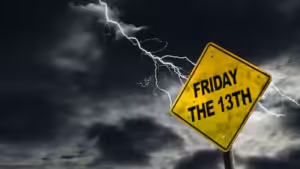Friday the 13th Superstitions: A Global Phenomenon
Friday the 13th superstitions have long intrigued and mystified people across cultures. Many believe that this day brings bad luck, and over the centuries, various traditions and beliefs have contributed to the fear surrounding it. From accidents to failed ventures, people have often linked unfortunate events to this specific date.
But why is Friday the 13th considered unlucky? To understand this, we need to explore the origins of the superstition, its place in history, and how different cultures interpret the day.
Origins of Friday the 13th Superstitions
The roots of Friday the 13th superstitions are a blend of religious, historical, and cultural factors. The number 13, in particular, has long been regarded as unlucky in many cultures. In Western numerology, 12 is seen as a “complete” number. We have 12 months in a year, 12 zodiac signs, and 12 hours on a clock face. Adding one more to this “perfect” set creates an imbalance, which is why some people consider 13 to be unlucky.
The idea that Friday is an unlucky day also has historical roots. In Christianity, Jesus was crucified on a Friday, and some believe this contributed to the belief that Fridays bring misfortune. Combine the superstition about the number 13 with an already unlucky day, and you get the foundation for Friday the 13th superstitions.
The Role of the Last Supper
One of the key factors contributing to Friday the 13th superstitions comes from the Bible. According to Christian tradition, the Last Supper had 13 attendees: Jesus and his 12 apostles. The belief is that Judas Iscariot, the apostle who betrayed Jesus, was the 13th guest at the table. This association of the number 13 with betrayal and death added to its ominous reputation.
Over time, the fear of the number 13 became widespread. Even today, many buildings avoid having a 13th floor, and some airlines skip row 13 on their planes.
Historical Events Linked to Friday the 13th
Beyond religious origins, Friday the 13th superstitions are linked to historical events that occurred on this fateful date. One of the most famous examples involves the Knights Templar, a powerful religious military order in the Middle Ages. On Friday, October 13, 1307, King Philip IV of France ordered the arrest of hundreds of Templars. Many were tortured and executed, marking the day as a dark moment in history. This event further fueled the association of Friday the 13th superstitions with bad luck and misfortune.
While some argue that this historical event may have played a significant role in solidifying the superstition, others believe it is a coincidence. Nevertheless, it’s one of the most well-known stories linked to Friday the 13th.
Popular Culture’s Influence on Friday the 13th Superstitions
In modern times, Friday the 13th superstitions have been perpetuated by popular culture. One of the most famous influences comes from the “Friday the 13th” horror movie franchise, which began in 1980. The film series, featuring the infamous masked killer Jason Voorhees, cemented Friday the 13th in the collective consciousness as a day of terror and fear. The franchise’s success only intensified the association of Friday the 13th superstitions with danger and evil.
Even though the movies are fictional, they contributed to a cultural reinforcement of the idea that this day is cursed. For those who already believed in Friday the 13th superstitions, the movies likely confirmed their fears, while for others, it added a new layer of intrigue and caution around the date.
Global Perspectives on Friday the 13th
Interestingly, Friday the 13th superstitions are not universal. While Western cultures, particularly in Europe and North America, may fear this day, other countries have different unlucky days. For instance, in Italy, Friday the 17th is considered unlucky, not the 13th. Similarly, in Greece and Spanish-speaking countries, Tuesday the 13th (known as “Martes Trece”) is the day associated with misfortune.
Despite these differences, Friday the 13th superstitions have gained global attention, thanks in part to Hollywood movies and the internet. The global exchange of cultural ideas has spread the notion that Friday the 13th is a day to be wary of, even in countries where it wasn’t traditionally seen as unlucky.
Psychological Impact of Friday the 13th Superstitions
Superstitions, such as those surrounding Friday the 13th, can have a real impact on people’s behaviour. The fear of the date is so prevalent that it has been given a name: “paraskevidekatriaphobia”—the irrational fear of Friday the 13th. Studies have shown that some people avoid flying, driving, or making important decisions on this day due to fear that something bad might happen.
Moreover, some businesses report that sales drop on Friday the 13th. For example, fewer people may choose to book flights or make major purchases due to their fear of bad luck. While the impact varies, it’s clear that Friday the 13th superstitions can influence personal decisions and economic activity.
Rational Explanations for the Fear
While superstitions often lack scientific backing, psychologists suggest that confirmation bias plays a significant role in why people believe in Friday the 13th superstitions. If someone expects something bad to happen on this day, they are more likely to notice or remember any negative events. This selective focus reinforces the belief that Friday the 13th is unlucky.
In reality, the date itself doesn’t cause bad things to happen. Accidents and mishaps occur every day, but when they happen on Friday the 13th, people attribute them to the date rather than chance.
Debunking the Myths
Many researchers have debunked the idea that Friday the 13th is an unlucky day. Studies have shown no significant increase in accidents, deaths, or misfortunes on this date compared to others. Despite this, the 13th superstitions persist, largely due to the cultural weight they carry.
While it’s important to respect different beliefs and superstitions, it’s equally crucial to recognize that fear of the date is based more on tradition and folklore than on fact.
Conclusion
Friday the 13th superstitions are a fascinating mix of history, religion, and popular culture. From biblical references to the fear of the number 13, many factors have contributed to the belief that this day is unlucky. While it’s easy to dismiss these superstitions as irrational, they have a real impact on people’s behaviour and decision-making.
Whether you’re a believer or a sceptic, the 13th superstition will likely continue to captivate and intrigue future generations. Ultimately, the fear surrounding this day serves as a reminder of the power that myths and cultural narratives hold over our lives.


